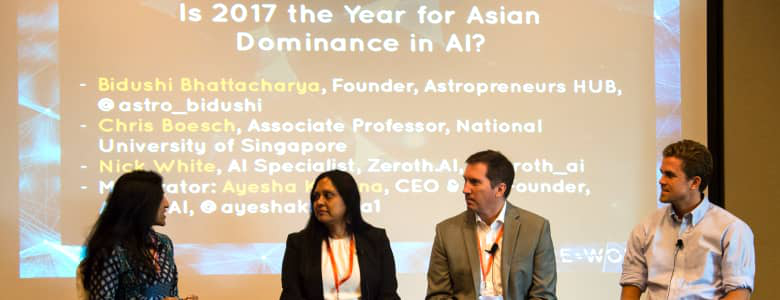Asia and Artificial Intelligence

First, a detour into outer space. Did you know that Southeast Asia has its very own incubator for space technologies?
The Singapore-based Astropreneurs HUB was founded in 2017 by former NASA rocket scientist Dr Bidushi Bhattacharya, to help startups get their technologies to market faster.
“We are seeing the democratisation of space,” said Dr Bhattacharya, noting that advances in technology have made it easier for small countries and startups to enter the playing field.
From monitoring agricultural crops with cube-sats (satellites small enough to hold in your hand) to mining asteroids for rare metals, numerous short- and long-term opportunities in space, are ripe for the picking, she added.
Dr Bhattacharya was speaking at a panel discussion titled Is 2017 the Year for Asian Dominance in Artificial Intelligence (AI)?, held on 28 April 2017 as part of the Deep Learning Summit Singapore.
Her fellow panel members were Associate Professor Chris Boesch, Deputy Director of the National University of Singapore (NUS) Institute for the Application of Learning Sciences and Educational Technology (ALSET); and Mr Nick White, senior AI specialist at accelerator programme Zeroth.ai.
In a dynamic and wide-ranging discussion moderated by Dr Ayesha Khanna, CEO of AI incubator ADDO AI, the panel shared their views on the opportunities and challenges for AI research and entrepreneurship in Asia.
Creating and keeping talent
Talent is aplenty in Asia, agreed the panel, especially now that anyone who wants to can take courses from top universities online, often at little or no cost.
But one advantage of an on-campus programme is the intrinsic motivation that students gain from being around other people, said Prof Boesch, who studies teaching and learning practices at ALSET.
Since most studies on teaching and learning have been done in the West, one of ALSET’s goals is to investigate the situation in Asia, said Prof Boesch. “Getting better data will lead to solutions that are better suited for Asian learners,” he added.
Talent retention is another problem: top talents from Asia are often snapped up by large American tech companies, who have pockets deep enough to offer hard-to-resist salaries.
As a result, tech companies in Asia sometimes find it difficult to fill positions, said the panel.
“I hope that in the future, people will see value in returning home [to Asia] with their education, but it’s hard to say no when companies offer you so much money,” said Mr White.
In addition, although STEM is highly valued, the low starting salaries in Asia for these disciplines often drive bright people into more lucrative areas such as finance and banking, said Dr Bhattacharya.
“The solution is two-fold. From the top, governments and industry have to support higher salaries. From the grassroots point of view, we have to go out and get the talent ourselves, rather than waiting for people to come to us,” she added.
“Governments have to find creative ways of keeping the industries they want at home,” agreed Prof Boesch.
The panel agreed that the critical issue is finding ways to inspire people to work on the most difficult and interesting problems, rather than gravitate to better-paid fields.
You always have to get students looking for bigger problems,” said Prof Boesch.
“You want them to think about how new technology has enabled things that weren’t possible before. As soon as they start realising that there’s a lot more complexity out there, they are excited to get to work.”
The willingness to fail
Another potential challenge for Asia, said the panel, is its lower appetite for risk.
“There is so much talent and momentum in Asia, but one of main barriers is cultural. A lot of capital is tied up in the older generation, who are more conservative and might not see the value in investing in something they don’t really grasp,” said Mr White. “The younger generation are passionate entrepreneurs, and we want to connect them to mentors and help them get seed capital.”
In the US, said Prof Boesch, people are more tolerant of failure; as long as one can learn from it and not repeat the same mistakes. “That’s not the case in Asia. You get one shot, and that naturally leads to some risk aversion.”
On the other hand, Asia can be less risk averse than the US when it comes to areas such as privacy, liability and productivity, said the panel.
“Asia is a little more aggressive when it comes to improving productivity. For example, it’s not as risk averse about moving to autonomous vehicles, which would be a big political issue in the US. This could be an opportunity,” said Prof Boesch.
Nonetheless, game-changing technologies always come with ethical dilemmas, and AI is no exception, said the panel.
Some regulations on AI are thus necessary, said Dr Khanna, and each society should come together to decide on what works best for them.
“The worst thing we can do in Asia is to blindly run after business models,” she said.
“Issues should be discussed and debated—these are social contracts that governments have with society and with businesses. This is a responsibility we have to our citizens.”
https://www.tech.gov.sg/media/technews/asia-and-artificial-intelligence
